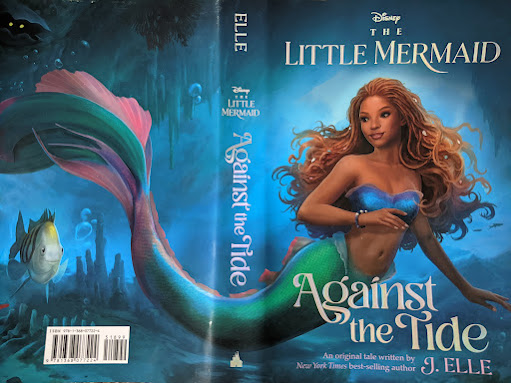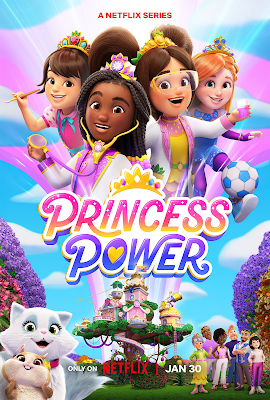Review: Against the Tide
The Ariel in this book is too busy learning how to rule her own kingdom to go on silly adventures collecting human knickknacks and take in unusual pets. In this world, every princess is granted her own kingdom in a different part of the ocean on her 15th birthday, complete with her own castle and royal court. It seems oddly convenient to have seven uninhabited kingdoms for every daughter of Triton with no other rulers. Instead of the colorful and heavily populated kingdom of Atlantica that Disney created in their animated adaptations, this world is cold, barren, and empty. Not only are all of Ariel's sisters separated by their individual kingdoms, which each encompass an entire sea, but there are no other merfolk that she interacts with outside of her own family. All of the servants in their various castles are either fish or crustaceans, and the one illicit romance in the book is between a mermaid and a sea monster. Instead of focusing on racism toward the humans to foreshadow the upcoming movie, the book instead introduces the rocky relations between merfolk and sea monsters as Ariel tries ease the tensions between their two races.
Ariel's sisters, who have been rewritten, redesigned, and renamed from the original canon, are all major players in this book. Ariel has a much closer relationship with them than she did in the animated Disney adaptations, where they functioned as a single unit while Ariel liked to sneak off on her own. Here, none of the sisters like each other, and Ariel is the glue that must hold them together. The sister Ariel is closest with is Perla, who resembles Arista from the animated world through both her personality and her red color scheme. Each sister has an H2O: Just Add Water-like superpower that they activate by singing, but these abilities are not a major part of the story. The plot begins when one of the sisters, Mala, is kidnapped on the eve of Ariel's ceremony to become a Protector of Carinae. The ceremony gets canceled, and Ariel begins a search to find her. Her quest takes her to all seven kingdoms as she recruits each of her sisters and convinces them to get along to help her find Mala. Along the way, she meets Flounder, who becomes her partner in crime in tracking down all sea monster Residents in her sisters' kingdoms and comparing notes to solve the mystery of Mala's disappearance. Recovering a kidnapped mermaid after receiving a ransom note is hardly a plot that would have been used in the animated series and seems to be an indicator of the darker tone that Disney is going for with their reimagined world.
Against the Tide presents a creative original mermaid world, but it does not feel like a Disney one. I felt like I had to put "Ariel" in quotes every time I saw her name because she acts so differently from the bubbly carefree mermaid I grew up with. The world in this book is so vast and yet so empty without any other mer-companions besides Ariel's sisters. There are no equivalents to characters like Urchin, Pearl, or Gabriella from the series. Giving each sister her own kingdom at the age of 15 to leave home and, in some cases like that of Tamika, never talk to her family again destroys the tight-knit dynamic of the original canon that made Triton so overprotective of Ariel in the first place. If all of his daughters swam away to different corners of the ocean as teenagers and were rarely seen again, he would not mind as much if Ariel wanted to go to the surface. Oddly enough, Ariel showed very little interest in the surface world. Humans were referred to as "MerHunters," and Ariel was just as afraid of them as everyone else. The book works okay on its own, but since it is clearly being targeted to fans of Disney's The Little Mermaid by featuring their version of the character, it seems rather tone deaf by reversing everything that has been established about the character for over three decades.












Comments
And Ariel follows the trend of "she is a queen ready to rule who just needs the world to give her a space" yet another book where the protagonist is actually more of a queen than a princess.
Honestly, it sounds like I'm not going to like the movie too much, it's too likely that the prince is a mere addition and true love doesn't appear if not by a long shot. Frankly "To kill a Kingdom" is a dark mermaid book with certain nods to the little mermaid but still shows true love as powerful.